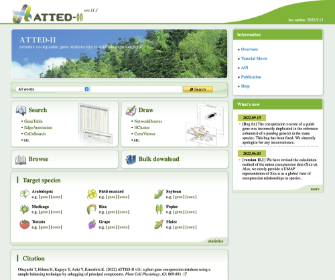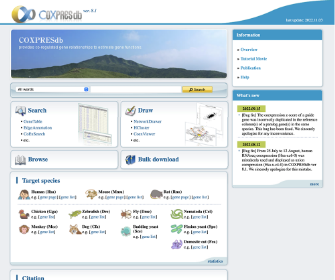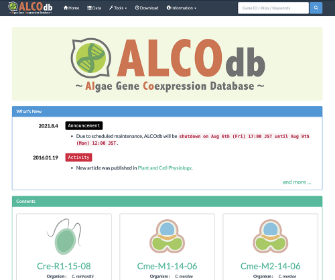What’s New
- 2026.1.19 The entry “Transcriptome,” authored by Prof. Takeshi Obayashi, has been published in the Dictionary of Theoretical Biology (Asakura Publishing).
- 2025.12.24 Naoki Sugimura was awarded "the MBSJ Poster Award 2025" at the 48th Annual Meeting of the Molecular Biology Society of Japan.
- 2025.12.24 6 new presentations added.
- 2025.11.14 5 new presentations added.
- 2025.11.10 Prof. Takeshi Obayashi has received the “2026 PCP Top Cited Regular Paper Award.”
Bioinformatics for Earth
Today's intense human activities threaten the sustainability of the natural world, and there is an urgent need to understand the current situation and take appropriate measures accurately. Meanwhile, we can "see" the world more accurately than ever, thanks to vast amounts of data.
Our laboratory extracts knowledge from the vast amount of data in the life sciences. We use a multilevel approach, from the gene level to the population level, to elucidate living systems as individuals or populations. We also work on the appropriate management and utilization of natural resources.




Basic Research
Systems Genomics
Complex systems are composed of combinations of simpler elements. In living systems, tens of thousands of genes are elaborately combined to form cellular systems, and different types of cells are combined to form tissues, organs, and individual systems. The genome, which consists of the four letters of ACGT, is the encoded multilevel system that makes up a given species. Correctly deciphering it reveals both the unique characteristics and potential vulnerabilities of the system. In particular, gene expression data (transcriptome data) is a fundamental resource that reflects the relationship between genes and cells. We extract information from this data using the approach of gene expression and co-expression and make it available as a database.
Basic Research
Marine Ecosystem Dynamics
The oceans, which cover about 70% of the Earth's surface, form a complex ecosystem inhabited by diverse life forms, from microorganisms to whales. We humans receive immense direct and indirect benefits from these seas, making the understanding and management of the marine environment an extremely important issue. Inaugurated in 2024 as a world-class research initiative, the Advanced Institute for Marine Ecosystem Change (WPI-AIMEC) is on a mission to explore the response and adaptation mechanisms of marine ecosystems to changes in the Earth's system, through an international and interdisciplinary research team. In particular, the Obayashi Unit in WPI-AIMEC, in collaboration with the Onagawa Field Center, aims to comprehensively elucidate the biological dynamics of Onagawa Bay through the analysis of physicochemical data and plankton genome analysis based on long-read sequencing. Furthermore, using Onagawa Bay as a model case, the unit strives to elucidate the marine dynamics of the Sanriku coast, ultimately contributing to environmental conservation on a global scale.

Applied Research
We aim to solve social issues by applying the technologies and resources developed through our basic research themes.
Bioenergy production
Photosynthesis is a reaction that uses light energy to fix carbon dioxide and attracts significant attention as a form of renewable energy. This research aims to produce bioenergy from microalgae by enhancing their lipid metabolism system and improving their culture efficiency.
Resource management
As an island nation, Japan has long utilized many fishery resources. In recent years, global demand for fishery resources has increased, and the sustainability of the fishing industry has become more critical than ever. Fish stock enhancement, famous for the release of salmon, enhances fishery resources by artificially hatching, growing, and releasing juveniles of fish. This practice is conducted in more than 40 countries, including Japan. On the other hand, it is not well understood whether the released fish are only caught or contribute to further reproduction in nature. In this study, we estimate the kinship relationship between released and natural individuals to understand the fisheries resource dynamics under the fish stock enhancement program.
Evolution triggered by human activity
Human activities have a significant impact on ecosystems at various levels. Recent advances in genome analysis technology have revealed the phenomenon of "self-domestication," in which organisms with traits more likely to coexist with human activities are enhanced in each region. On the other hand, humans have long engaged in trade to link regional goods and information, contributing to habitat expansion and disturbance. The history of trade in each region is key to dealing with biological evolution at the global level. However, because many societies are illiterate, many areas remain black boxes. This study takes the approach by inferring the geographic origin of words based on cross-linguistic similarity and attempts to elucidate how natural resources in each region have been transmitted and utilized.
Members
 TAKESHI
TAKESHIOBAYASHI
-
Technical Assistant
Akane KITAMURA
-
Technical Assistant
Dalia KHATUN
-
Secretary
Aiko NAGATA
-
M2
Shoma HEMMI
-
M2
Daffa APRILIO
-
M2
Jaronchai DILOKKALAYAKUL
-
M1
Namuunbayar GANCHIMEG
-
M1
Naoki SUGIMURA
-
B4
Hayate KATO
Advanced Institute for Marine Ecosystem Change (WPI-AIMEC)
-
Takeshi OBAYASHI
Unit Leader (Graduate School of Information Sciences, Professor)
-
Minoru IKEDA
AIMEC Researcher (Onagawa Field Center, Graduate School of Agricultural Science, Professor)
-
Toyonobu FUJII
AIMEC Researcher (Onagawa Field Center, Graduate School of Agricultural Science , Assoc. Professor)
-
Tomoko HAMABATA
AIMEC Researcher
-
Batdulam BATTULGA
AIMEC Specially Appointed Research Fellow
-
Diego DEVILLE CACERES
AIMEC Specially Appointed Research Fellow
-
Akane KITAMURA
AIMEC Tech. Asst.
 TAKESHI
TAKESHIOBAYASHI
Access
Graduate School of Information Sciences, Tohoku University 6-3-09, Aramaki-Aza-Aoba, Aoba-ku, Sendai 980-8579, JapanOur laboratory is on the 2nd floor of the Graduate School of Information Science building.






